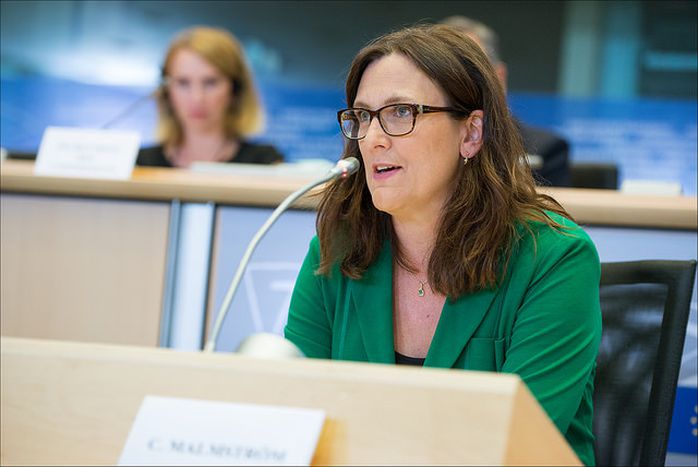
Cecilia Malmström : A polite but "transparent" refusal to suspend the TTIP
Published on
Translation by:
Danica JordenMonday 29 September was the first day of hearings for commissioners to the European Parliament. And it’s Cecilia Malmström, nominated for the international trade portfolio, who set the tone.
Note to readers : Cafébabel Bruxelles has been interested for several months in the Transatlantic Trade and Investment Partnership treaty (or TTIP). In order to better understand what’s at stake in the Cecilia Malmström hearing, reread our articles here or here.
Presently Commissioner for Home Affairs, Swedish liberal Cecilia Malmström is expected to be elected to the post of Commissioner for International Trade, excepting a surprise action by the European Parliament. A Francophile, at 46 years of age, she is one of the junior European commissioners.
The International Trade portfolio was considered a promotion, and the Scandinavian’s personality could ease relations with Parliament compared to her Belgian predecessor, the very liberal Karel de Gucht.
The European Union’s trade policy is a hotly debated topic. More than thirty agreements between the EU and the rest of the world are now in the course of being negotiated. These agreements will directly affect 30 million jobs, as well as all of the Union’s foreign economic sectors, from tomatoes to aeroplane cabins. Two at the forefront of debate: the CETA agreement between the European Union and Canada, and the thorny TTIP between the 28 States and Washington.
Reinforcing transparency
Without a doubt, “transparency” was the key word at the hearing, and in effect, one of the chief grievances of parliamentarians concerning the Commission and Member States. Under the pretext of trade negotiations confidentiality, little reliable information was available to the general public. So, given the consequences and fallout of these accords, who could not be suspicious?
But to what point does transparency go? While Cecilia Malmström promises measures to increase transparency in December, with, as a common thread, better involvement of parliamentarians and NGOs in ongoing negotiations, deputies remain unsatisfied about concrete tools.
The first test will doubtless be the presentation of the results of discussions on arbitration court measures (i.e. going to private tribunals to settle trade disputes between States and businesses). Nearly 150,000 responses have been registered, a record that well illustrates the extreme anxiety over this bilateral free trade accord.
Mixup on the Canada agreement
After a ten-minute presentation by the nominee commissioner, parliamentarians have only three days before the hearing to deal with barely disguised criticisms challenging the EU-Canada accord, for which negotiations quietly ended in Ottawa on Friday 26 September.
The EU-Canada accord includes the famous ISDS, or arbitration tribunal measures, exasperating deputies across the board. Cecilia Malmström does not wish to reopen negotiations for fear of slowing the validation schedule and the accord’s ratification.
The ball is therefore in the deputies’ court. The accord should be voted on before the 2015 summer holiday, and then must be validated by all national parliaments.
Are the arbitrage courts arbitrary?
Why are these specific tribunals the subject of debate? ISDS is a judicial mechanism that already exists in international trade agreements. It involves referring trade disputes between national governments and businesses to a specific jurisdiction. The German government, since choosing to stop nuclear energy, was subsequently subject to a complaint by a Swedish company for damages plus interests due to this political choice, just as the province of Québec is under attack by Chevron, an oil company, based on the fact of its moratorium on shale gas exploitation.
What opponents to these measures fear most is the principle that decisions voted upon by national parliaments can be called into question by private interests. If the outgoing Commission decides to maintain this measure in order to encourage investment, Jean-Claude Juncker announced on 16 July he will oppose the private court measure before European deputies.
Cecilia Malmström’s response is more qualified. While at the same time condemning the perverse effects of the measure, she persists in trying to find an equitable solution by including more of civil society or by insisting upon clauses for the environment or Human Rights. But this exercise in tightrope walking has not convinced environmentalist deputies or the radical left who disapproved of her nomination.
Going ahead with TTIP and opening dialogue with China
“Two billion euros are traded every day between the European Union and the United States,” the Swedish commissioner pointed out. Suspending the TTIP negotiations is not an option, but working on transparency is, so the Commission’s position remains the same.
For now, the premise of an accord similar to the TTIP between the EU and China does not seem to be on the agenda. Chinese economic and commercial dumping makes deputies anxious even while they feel that Cecilia Malmström’s desire to open debate with Parliament and the States would not reinforce controls and incite the Chinese to respect the rules. So it’s wait and see.
Translated from Cecilia Malmström : un refus poli mais "transparent" pour suspendre le TTIP



